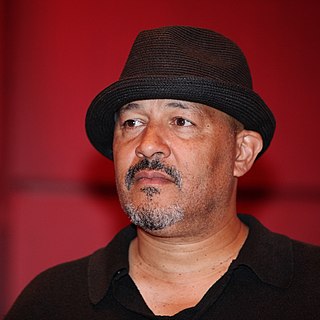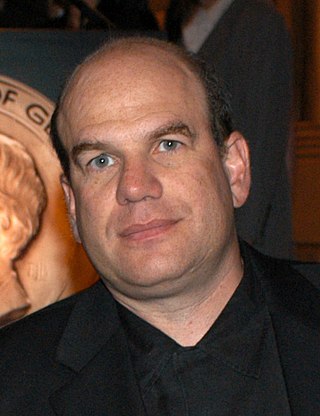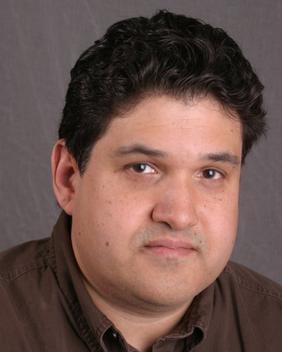Related Research Articles
Homicide: Life on the Street is an American police drama television series chronicling the work of a fictional version of the Baltimore Police Department's Homicide Unit. It ran for seven seasons and 122 episodes on NBC from January 31, 1993, to May 21, 1999, and was succeeded by Homicide: The Movie (2000), which served as the series finale. The series was created by Paul Attanasio and based on David Simon's book Homicide: A Year on the Killing Streets (1991). Many of the characters and stories used throughout the show were based on events depicted in the book.

Clark Johnson is an American-Canadian actor and director who has worked in both television and film. He is best known for his roles as David Jefferson in Night Heat (1985–1988), Clark Roberts in E.N.G. (1989–1994), Meldrick Lewis in Homicide: Life on the Street (1993–1999) and Augustus Haynes in The Wire (2008). He is an Emmy Award and two-time Genie Award nominee.

Tom Fontana is an American screenwriter, writer, and television producer. Fontana worked on NBC's Homicide: Life on the Street and created HBO's Oz.

David Judah Simon is an American author, journalist, screenwriter, and producer best known for his work on The Wire (2002–2008).

The first season of Homicide: Life on the Street, an American police procedural drama television series, originally aired in the United States on NBC between January 31 and March 31, 1993. The show was created by Paul Attanasio, with film director Barry Levinson and television writer and producer Tom Fontana serving as executive producers. Adapted from David Simon's 1991 non-fiction book Homicide: A Year on the Killing Streets, the season followed the fictional detectives of Baltimore Police Department homicide unit and the murder cases they investigate. The show was broadcast on Wednesdays at 9 p.m. EST, with the exception of the series premiere, which aired immediately after Super Bowl XXVII.

The second season of Homicide: Life on the Street, an American police procedural drama television series, originally aired in the United States between January 6 and January 27, 1994. Due to low Nielsen ratings during the first season, NBC executives decided to order only a four-episode season, after which they would evaluate the ratings and decide whether to renew the show. Homicide was moved to a new timeslot of Thursdays at 10 p.m. EST, temporarily replacing the legal drama L.A. Law. NBC requested several changes from the series, including fewer episode subplots and less camera movements and jump cuts.
Alfred Henry Bromell was an American novelist, screenwriter, and director.

Eric Ellis Overmyer is an American writer and producer. He has written and/or produced numerous TV shows, including St. Elsewhere, Homicide: Life on the Street, Law & Order, The Wire, New Amsterdam, Bosch, Treme, and The Man in the High Castle.

David Eugene Mills was an American journalist, of Pamunkey Indian descent writer and producer of television programs. He was an executive producer and writer of the HBO miniseries The Corner, for which he won two Emmy Awards, and the creator, executive producer, and writer of the NBC miniseries Kingpin.
Joy Lusco, also known as Joy Kecken and Joy Lusco Kecken, is an American film and television director and writer. She often works with her husband, Scott Kecken. They worked on the HBO drama series The Wire on four of the show's five seasons.

"Subway" is the seventh episode of the sixth season of the American police television drama Homicide: Life on the Street, and the 84th episode overall. It first aired on NBC in the United States on December 5, 1997. In the episode, John Lange becomes pinned between a Baltimore Metro Subway train and the station platform. The Baltimore homicide department is informed that Lange will be dead within an hour and Pembleton tries to solve the case while comforting Lange in his final minutes.

"Gone for Goode" is the first episode of the first season of the American police drama television series Homicide: Life on the Street. It originally aired on NBC in the United States on January 31, 1993, immediately following Super Bowl XXVII. The episode was written by series creator Paul Attanasio and directed by executive producer Barry Levinson. "Gone for Goode" introduced regular cast members Daniel Baldwin, Ned Beatty, Richard Belzer, Andre Braugher, Wendy Hughes, Clark Johnson, Yaphet Kotto, Melissa Leo, Jon Polito, and Kyle Secor.

"Three Men and Adena" is the fifth episode of the first season of the American police drama television series Homicide: Life on the Street. It originally aired on NBC in the United States on March 3, 1993. The episode was written by executive producer Tom Fontana and directed by Martin Campbell. In the episode, Pembleton and Bayliss have a 12-hour limit to elicit a confession from Risley Tucker for the murder of 11-year-old Adena Watson. The episode takes place almost entirely within the confines of the police interrogation room with the three actors.

"Son of a Gun" is the third episode of the first season of the American police drama television series Homicide: Life on the Street. It originally aired on NBC in the United States on February 10, 1993. The teleplay was written by James Yoshimura based on a story by executive producer Tom Fontana, and the episode was directed by Nick Gomez. In the episode, recurring character Officer Thormann is shot while on duty, and his close friend Crosetti takes the investigation personally.

"Bop Gun" is the second season premiere of the American police drama television series Homicide: Life on the Street, and the tenth overall episode of the series. It originally aired on NBC in the United States on January 6, 1994. In the episode, the Baltimore homicide unit investigates the shooting death of the wife of a tourist, played by guest star Robin Williams.

"Night of the Dead Living" is the ninth episode and first season finale of the American police drama television series Homicide: Life on the Street. It originally aired on NBC in the United States on March 31, 1993. In the episode, the homicide squad works the night shift on a summer evening, but no calls come in, leaving the detectives to brood over their personal matters. The teleplay was written by Frank Pugliese based on a story he wrote along with executive producer Tom Fontana. It was directed by Michael Lehmann.
Bonnie Mark is an American former television writer and producer. She worked on the ABC crime drama NYPD Blue and the NBC crime dramas Third Watch and Homicide: Life on the Street. She was nominated for a Writers Guild of America Award for her work on Homicide.
Julie Martin is an American television writer and producer. She has worked on the NBC crime dramas Homicide: Life on the Street, Law & Order: Criminal Intent, Law & Order and Law & Order: Special Victims Unit. She won a Humanitas Prize and was nominated for a Writers Guild of America Award for her work on Homicide. She has also been nominated for an Edgar Award for her work on Criminal Intent.
Jorge Zamacona is an American television writer and producer. He worked extensively on the police drama Homicide: Life on the Street and wrote the series' crossover episodes with the crime drama Law & Order. Zamacona co-created the police dramas 10-8: Officers on Duty and Wanted.
"Black and Blue" is the third episode of the second season of the American police drama television series Homicide: Life on the Street, and the twelfth overall episode of the series. It originally aired on NBC in the United States on January 20, 1994. In the episode, Pembleton aggressively investigates what he believes to be a police-related shooting. Amid pressure from Gee to pursue civilian suspects, Pembleton elicits a successful confession from an innocent man, leaving Gee feeling conflicted. Directed by Chris Menaul, the episode's teleplay was written by James Yoshimura based on a story by series executive producer Tom Fontana.
References
- 1 2 Bogosian, Theodore (1998-11-04). Anatomy of "Homicide: Life on the Street" (Documentary). Baltimore, Maryland: Public Broadcasting Service.
- ↑ Witchel, Alex (2006-03-13). "Shades of Black Humor". The New York Times Magazine . Retrieved 2009-07-08.
- ↑ "Playwright conference will develop 15 plays". The New York Times . New York City, New York. 1985-07-03. Retrieved 2009-07-08.
- ↑ Rich, Frank (1982-07-08). "The stage: American "Mercenaries" in Caribbean". The New York Times . New York City, New York . Retrieved 2009-07-08.
- ↑ Nussbaum, Emily (2004-05-24). "It's not HBO. It's TV. With his new show, The Jury, Tom Fontana is trying to sneak the values of Oz onto the network of The Swan. Perhaps there's hope for television after all". New York . New York City, New York . Retrieved 2009-07-08.
- ↑ Mutrux, Gail (1998-11-04). Anatomy of "Homicide: Life on the Street" (Documentary). Baltimore, Maryland: Public Broadcasting Service.
- ↑ Kaltenbach, Chris (1997-08-31). "Homicide: Still on the Street; The ratings haven't been all that the TV honchos would like, but Baltimore's finest is hanging in there for a sixth season". The Baltimore Sun . Baltimore, Maryland. p. 1E.
- ↑ Zurawik, David; Kaltenbach, Chris (1999-05-16). ""Homicide": The best of the best". The Baltimore Sun . p. 5F.
- ↑ Phillips, Barbara A. (1998-11-02). "Behind the Scenes Of a "Homicide"". The Wall Street Journal . New York City, New York . Retrieved 2009-06-22.
- ↑ Scott, Janny (2000-06-11). "Who Gets to Tell a Black Story?". The New York Times . New York City. Retrieved 2009-07-08.
- ↑ Weinraub, Bernard (2000-02-06). "Television/radio; A gritty portrayal of police life gets a kind of closure". The New York Times . New York City, New York . Retrieved 2009-07-08.
- ↑ Reese, Lori (2000-09-10). "Trophy Hunting: "The West Wing" and "The Sopranos" score big, while Sarah Michelle Gellar is ignored again". Entertainment Weekly . Los Angeles, California . Retrieved 2009-07-08.
- ↑ Johnson, Allan (2000-09-11). "Political drama wins 5; "Will" gets 3; Tony (Soprano) wins an Emmy". Chicago Tribune . Chicago, Illinois. p. 1.
- ↑ Stanley, Alessandra (2004-06-08). "TELEVISION REVIEW; They Meet Secretly, Bicker and Try to Return a Verdict". The New York Times. New York City, New York . Retrieved 2009-07-08.
- ↑ Walker, Dave (2010-06-22). "'Homicide' veteran James Yoshimura to join 'Treme' writing team". The Times-Picayune . New Orleans, Louisiana . Retrieved 2014-08-15.
- ↑ Rose, Lacey (2013-02-12). "'Homeland' Adds First New Writer For Season 3". The Hollywood Reporter . Los Angeles, California . Retrieved 2014-08-15.